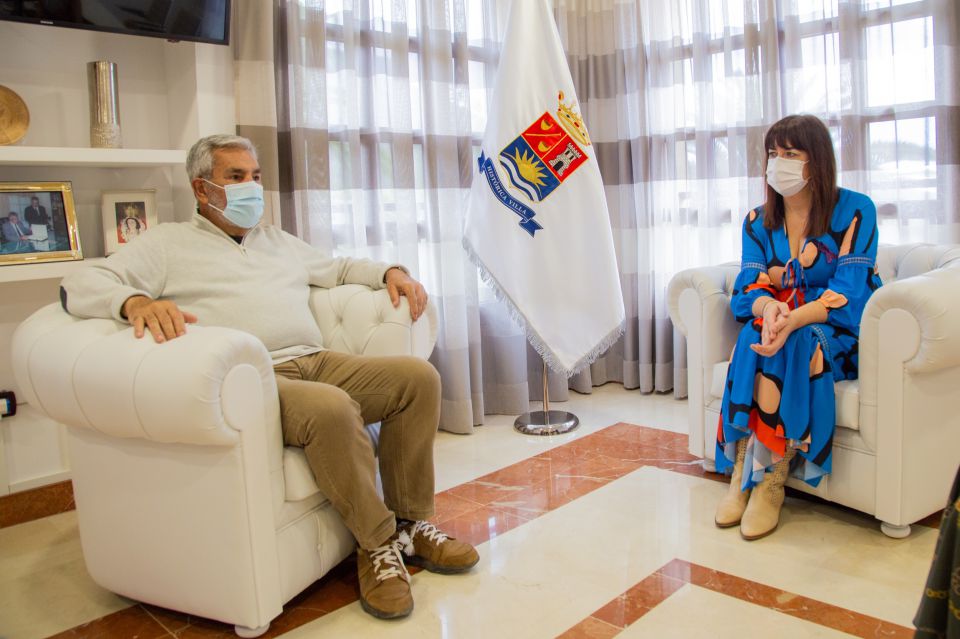The Adeje mayor José Miguel Rodríguez Fraga has announced the winners of the 2021 Abinque prize, given annually to an individual or group of women who have, through their work and dedication, advanced the movement for real equality between women and men. This year’s winners are the women who work in health care in the borough, both in the Adeje and Armeñime health centres, from directors to doctors, nurses, auxiliary workers, administration and laboratory personnel, midwives, and sanitation staff.
The mayor said, “This year we are granting the Abinque prize to a group of women who direct, manage and oversee our health centres. Fundamentally they, as health professionals, have broken the glass ceiling, something seen as virtually impossible not so long ago”.
In this regard José Miguel Rodríguez Fraga observed, “In Adeje we have two women as the directors of both the Adeje Centre and the Armeñime Clinic and without a doubt their management has been notable, not just in the day to day running of the centres but the work they and their teams have done, beyond their usual duties, during the course of this pandemic.
“Even though the care sector has always had a female presence, and in the past certain tasks were seen as done only by women, it is still only relatively recently that women professionals in the sector are valued, properly paid, and recognised for what they are, professionals who need to occupy positions of leadership because they are more than capable”, said the mayor.
The Abinque prize is an initiate of the departments of health and equality, currently headed up by councillors Amada Trujillo Bencomo and Juan Desiderio Afonso Ruiz respectively. The prize this year recognises those who have been active and meriting recognition not just in 2020 but into 2021 as well, the months and years marked by the Covid-19 pandemic.
All of the women who are included in this year’s prize have been on the front line during this health crisis; these are the people we applauded during the months of lockdown last year. They were the ones who led, who had to merge their commitments to their family as well as their professional lives to be in a position to care for those in need.
By recognising this group of women, all playing an important part in the health service, we are also highlighting the kind of pressure the health service has been under as a result of the pandemic, creating increasingly difficult conditions for those working in the sector, many who work long hours and days placing themselves in danger on a regular basis.
DATA
The reality in Spain and in the Spanish health sector is that the area of health science is where most women do find alternative work.
According to a report by the Spanish department of employment and social economy - “The situation regarding women in the labour market, 2019”- the sectors in which more women are working are: services sector (8 million women) in commerce, health, hostelry, and education, with low representation in the industrial and construction sectors. Advances in female employment in 2019 have been concentrated in professional areas, the manufacturing industry, public administration.
The report also shows that of the women who opt to work in the professional and scientific sectors, a majority are in mid-level positions although they are in the majority in their sectors, which top director positions held by men, in 2/3 of cases. In 2018 the data indicated that 76% of women had bosses but no subordinates, against 63% of men.
More women are also in part-time work – nearly 3 in every 4, and that has risen by 4% during the pandemic. The number of women reduced to part-time work choices increases with maternity and depending on the number of children in a family too.
The number of female entrepreneurs is low – only 6% of the sector overall. Spain is currently holding a mid-table place in this regard in comparison to their European neighbours, behind countries like Luxembourg, Holland, Austria and Ireland.
The salary gap in Spain in 2018 stood at 14%, 1.9 points below the European average, and in fact in this regard Spain is the country where the gap has shrunk most since 2012 in the Eurozone.
Previous Abinque winners
2004 –Tenerife Housekeepers Association (hotel industry)
2005 – Union of Saharan Women
2006 - Orbelinda Pérez Medina, educator
2007 - Ana Oneida Borges Medina, president, Asociación San Juan
2008 - Amada Trujillo Bencomo, paediatrician
2009 – Volunteer home visitors.
2010 - Rosa María Medina García, volunteer
2011 – Tomato and banana packers
2012 - Limpiezas Domínguez and teams
2013- María Isabel Fernández González, founder and director of the Niño de Adeje creche
2014 - Brigitte Gypen, founder of Walk for Life
2015- Adeje’s oldest female residents
2016 - Alexandra Rinder, Adeje’s youngest elite sportstar
2017- Ángeles Nieves García Rodríguez, Montesdeoca artesan cheeses
2018- Adeje Equality Council.
2019 - Rosa María Pérez Meiriño, singer and music professor
2020 - Cristina Lorenzo Ibáñez, marine biologist and marine conservationist
2021 – Women in the Adeje and Armeñime health centres
